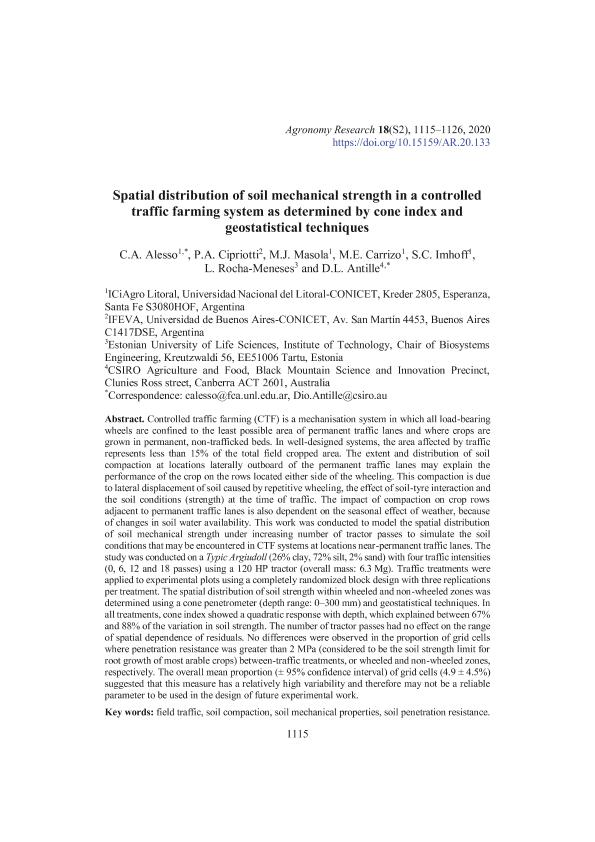Mostrar el registro sencillo del ítem
dc.contributor.author
Alesso, Carlos Agustín

dc.contributor.author
Cipriotti, Pablo Ariel

dc.contributor.author
Masola, María Josefina

dc.contributor.author
Carrizo, Maria Eugenia

dc.contributor.author
Imhoff, Silvia del Carmen

dc.contributor.author
Rocha Meneses, L.
dc.contributor.author
Antille, D. L.
dc.date.available
2022-09-19T20:24:26Z
dc.date.issued
2020-05
dc.identifier.citation
Alesso, Carlos Agustín; Cipriotti, Pablo Ariel; Masola, María Josefina; Carrizo, Maria Eugenia; Imhoff, Silvia del Carmen; et al.; Spatial distribution of soil mechanical strength in a controlled traffic farming system as determined by cone index and geostatistical techniques; Eesti Pollumajandusulikool; Agronomy Research; 18; Special Issue 2; 5-2020; 1115-1126
dc.identifier.issn
1406-894X
dc.identifier.uri
http://hdl.handle.net/11336/169390
dc.description.abstract
Controlled traffic farming (CTF) is a mechanisation system in which all load-bearing wheels are confined to the least possible area of permanent traffic lanes and where crops are grown in permanent, non-trafficked beds. In well-designed systems, the area affected by traffic represents less than 15% of the total field cropped area. The extent and distribution of soil compaction at locations laterally outboard of the permanent traffic lanes may explain the performance of the crop on the rows located either side of the wheeling. This compaction is due to lateral displacement of soil caused by repetitive wheeling, the effect of soil-tyre interaction and the soil conditions (strength) at the time of traffic. The impact of compaction on crop rows adjacent to permanent traffic lanes is also dependent on the seasonal effect of weather, because of changes in soil water availability. This work was conducted to model the spatial distribution of soil mechanical strength under increasing number of tractor passes to simulate the soil conditions that may be encountered in CTF systems at locations near-permanent traffic lanes. The study was conducted on a Typic Argiudoll (26% clay, 72% silt, 2% sand) with four traffic intensities (0, 6, 12 and 18 passes) using a 120 HP tractor (overall mass: 6.3 Mg). Traffic treatments were applied to experimental plots using a completely randomized block design with three replications per treatment. The spatial distribution of soil strength within wheeled and non-wheeled zones was determined using a cone penetrometer (depth range: 0–300 mm) and geostatistical techniques. In all treatments, cone index showed a quadratic response with depth, which explained between 67% and 88% of the variation in soil strength. The number of tractor passes had no effect on the range of spatial dependence of residuals. No differences were observed in the proportion of grid cells where penetration resistance was greater than 2 MPa (considered to be the soil strength limit for root growth of most arable crops) between-traffic treatments, or wheeled and non-wheeled zones, respectively. The overall mean proportion (± 95% confidence interval) of grid cells (4.9 ± 4.5%) suggested that this measure has a relatively high variability and therefore may not be a reliable parameter to be used in the design of future experimental work.
dc.format
application/pdf
dc.language.iso
eng
dc.publisher
Eesti Pollumajandusulikool
dc.rights
info:eu-repo/semantics/openAccess
dc.rights.uri
https://creativecommons.org/licenses/by-nc-nd/2.5/ar/
dc.subject
FIELD TRAFFIC
dc.subject
SOIL COMPACTION
dc.subject
SOIL MECHANICAL PROPERTIES
dc.subject
SOIL PENETRATION RESISTANCE
dc.subject.classification
Otras Ciencias de la Tierra y relacionadas con el Medio Ambiente

dc.subject.classification
Ciencias de la Tierra y relacionadas con el Medio Ambiente

dc.subject.classification
CIENCIAS NATURALES Y EXACTAS

dc.title
Spatial distribution of soil mechanical strength in a controlled traffic farming system as determined by cone index and geostatistical techniques
dc.type
info:eu-repo/semantics/article
dc.type
info:ar-repo/semantics/artículo
dc.type
info:eu-repo/semantics/publishedVersion
dc.date.updated
2021-09-20T14:31:53Z
dc.journal.volume
18
dc.journal.number
Special Issue 2
dc.journal.pagination
1115-1126
dc.journal.pais
Estonia

dc.journal.ciudad
Põltsamaa
dc.description.fil
Fil: Alesso, Carlos Agustín. Consejo Nacional de Investigaciones Científicas y Técnicas. Instituto de Ciencias Agropecuarias del Litoral. Universidad Nacional del Litoral. Instituto de Ciencias Agropecuarias del Litoral; Argentina
dc.description.fil
Fil: Cipriotti, Pablo Ariel. Consejo Nacional de Investigaciones Científicas y Técnicas. Oficina de Coordinación Administrativa Parque Centenario. Instituto de Investigaciones Fisiológicas y Ecológicas Vinculadas a la Agricultura. Universidad de Buenos Aires. Facultad de Agronomía. Instituto de Investigaciones Fisiológicas y Ecológicas Vinculadas a la Agricultura; Argentina
dc.description.fil
Fil: Masola, María Josefina. Consejo Nacional de Investigaciones Científicas y Técnicas. Instituto de Ciencias Agropecuarias del Litoral. Universidad Nacional del Litoral. Instituto de Ciencias Agropecuarias del Litoral; Argentina
dc.description.fil
Fil: Carrizo, Maria Eugenia. Consejo Nacional de Investigaciones Científicas y Técnicas. Instituto de Ciencias Agropecuarias del Litoral. Universidad Nacional del Litoral. Instituto de Ciencias Agropecuarias del Litoral; Argentina
dc.description.fil
Fil: Imhoff, Silvia del Carmen. Consejo Nacional de Investigaciones Científicas y Técnicas. Instituto de Ciencias Agropecuarias del Litoral. Universidad Nacional del Litoral. Instituto de Ciencias Agropecuarias del Litoral; Argentina
dc.description.fil
Fil: Rocha Meneses, L.. Estonian University of Life Sciences. Institute of Technology; Estonia
dc.description.fil
Fil: Antille, D. L.. CSIRO Agriculture and Food; Australia
dc.journal.title
Agronomy Research
dc.relation.alternativeid
info:eu-repo/semantics/altIdentifier/doi/https://doi.org/10.15159/ar.20.133
dc.relation.alternativeid
info:eu-repo/semantics/altIdentifier/url/https://dspace.emu.ee/xmlui/handle/10492/6057
Archivos asociados
